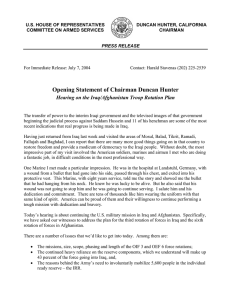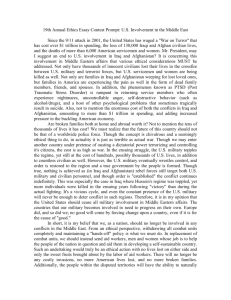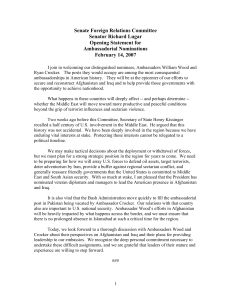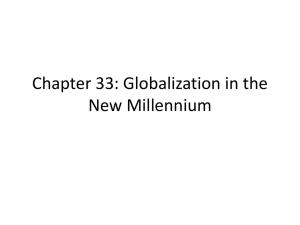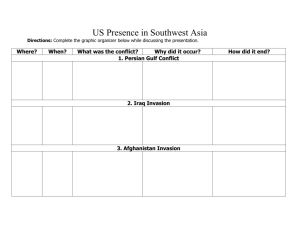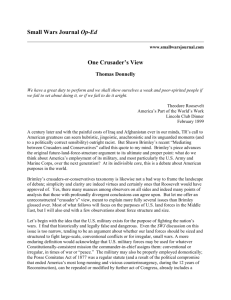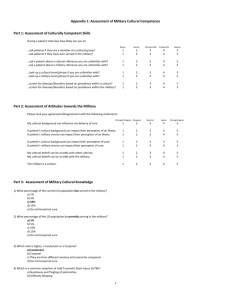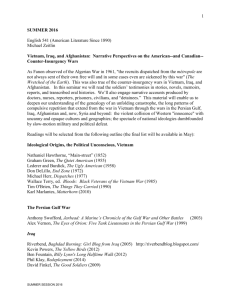Outsourcing Security Services to Private Military and Security
advertisement
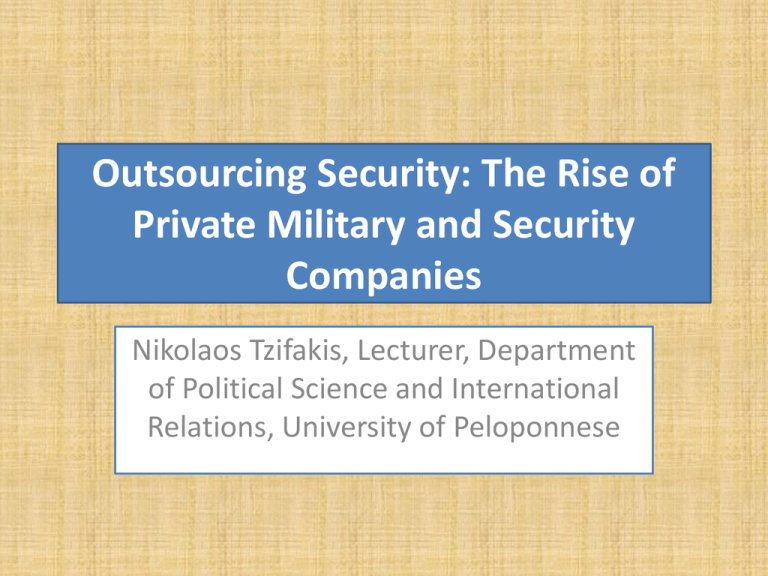
Outsourcing Security: The Rise of Private Military and Security Companies Nikolaos Tzifakis, Lecturer, Department of Political Science and International Relations, University of Peloponnese Growth of Private Security Sector • World Security Service Market: • 2007: $138.6 billion • 2009: $152.5 billion • 2014: $218.4 billion A very …diverse Sector • Common tasks • protection services of assets and/or people • training, restructuring and modernising of armies and police forces; • collection and analysis of intelligence; • security of military communications; • operation of technologically advanced military systems; • military transportation and protection of strategic targets; • clearing of minefields; • language interpretation and interrogation of prisoners; • logistics Typology of Private Military and Security Companies Private Security Companies 125 countries 657,000 employees annual revenues: 2004 - £3 billion 2011 - £7.5 billion 51 countries 300,000 employees 2009-2010: acquisition of 30 companies in different countries Private Military Companies 40 locations in the United States and in several countries more generals than the US army in its service 6,000 peacekeepers and trainers to 11 countries 2010: $3.4 billion (32.2% increase of annual turnover) Typical Contract Chain in Afghanistan, Iraq • Prime Contractors • US-based subcontractors • Recruiting countries (e.g. India) • Companies in the location of deployment 2008: 29 of the top defence contractors of the United States had at least 1,194 offshore subsidiaries. Types of relationships between states and PMSCs • Contracting States • States of Operations • Home States • Third States Driving forces behind the growth of the private security market Enabling Conditions • change in the global demand/supply of security forces • military interventions in Afghanistan and Iraq • transformation of the public police and the military in many countries Alleged advantages of private security industry • Cutbacks to public expenditures • Professionalism, experience, specialised expertise • Innovative thought • Adaptability to new threats • Security gap Private Security contractors in Iraq Private Security contractors in Afghanistan Security as a good Types of goods Non-excludable Excludable Non-rival Public good Club good Rival Common good Private good National security as a good Public Providers Private Providers Security is a public good Security is a public good Sub-state or individual security as a good Public Providers Private Providers Security is a common good Security is a club good Security is a private good Security as a commodity: Political externalities • It releases states from part of their responsibility to protect their citizens • Security is gradually depoliticised • Strengthens the executive at the expense of the legislative branch of government • PMCs an important role over the determination of security discourses and the corresponding policies • supply creates its own demand • security is militarized Contract management and cost efficiency • • • • • • • • • • • No-bid contracts (60% of US DoD 2004) Existence of monopolies (67% of non-competitive contracts) ‘Cost-plus’ contracts Poor contract oversight US in Iraq: 34,728 contracting actions = $35.9 billion (2003- June 2011) 1992-2006: dollar value of US army contracts increased 331% and the number of army contract actions increased 654% only 38% of the US Army contracting workforce deployed in theater operations are certified for the positions held 2009: the US GAO reviewed 69 audits of the Defense Contract Audit Agency and found that in 65 of them there were serious ‘deficiencies that rendered them unreliable’ Outsourcing contract oversight or self-evaluation No disruption in the supply of services 2004 KBR contract in Iraq, expenses of over $1 billion Frauds, wastes, abuses, mismanagements • the US DoD Inspector General: US paid $160 to $204 million more for the supply of fuel in Iraq. • Supreme Foodservice charged the US with $454.9 million to airlift fresh fruit and vegetables in Afghanistan (not required in the contract) • Blackwater billed the US State Department with the salary cost of a prostitute in Kabul • Airscan utilized unencrypted commercial television relays from 2001 to 2002 to transmit U.S. military intelligence data in Kosovo • ‘Federal Contractor Misconduct Database’ …893 instances of misconduct collectively amounting to more than $40 billion Illegitimate violence, human rights and impunity From Blackwater to …Xe In search of norms and regulations • 1977 Additional Protocols to the Geneva Conventions • International Convention against the Recruitment, Use, Financing and Training of Mercenaries • IHL: combatants and civilians • Draft Articles on Responsibility of States for Internationally Wrongful Acts • Draft of a possible Convention on Private Military and Security Companies • Montreux Document • International Code of Conduct for Private Security Service Providers Conclusions – Policy recommendations • • • • • • • • • • • Prevent supply from determining its own demand; launch competitive bids for every single contract; refrain from awarding cost-plus contracts; avoid outsourcing services to monopolies; increasing the capacity and authority of oversight institutions; evade transferring contract supervision to private agencies; calculate the cost of contract management; regulate the operation of PMSCs; reverse the climate of general impunity; explicitly stipulate the responsibility of prime contractors; exclude from future contracts seriously misbehaving PMSCs.
